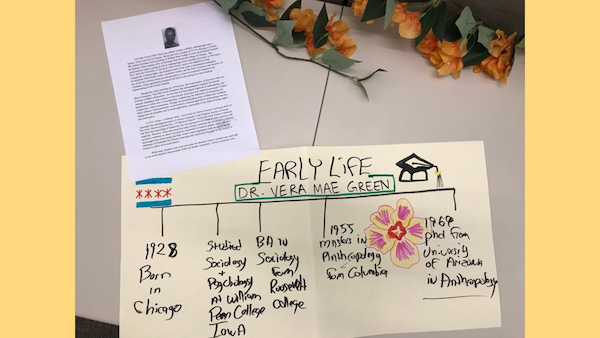
On February 19th, PYM staff gathered in the Rufus Jones Room for a Meeting for Learning, with a focus on Black Quaker contributions. While Black History Month provides a moment to center these contributions, we recognize that the legacies of Black Quakers are essential to the ongoing story of Quakerism and deserve continuous reflection. After an initial discussion, we broke into small groups to create collages that highlighted the lives and impacts of individual Black Quakers, showcasing their enduring influence on both the Society of Friends and society at large.
- Paul Cuffe (1759–1817) – A Quaker merchant, shipowner, and philanthropist, Cuffe is remembered for his advocacy of economic self-sufficiency and justice for all people. He supported the construction of the Westport Friends Meeting House, a local school, and a hospital, and worked toward the resettlement of free Black people in Sierra Leone, fostering a self-sustaining community grounded in Quaker values.
- Robert Purvis (1810–1898) – A prominent abolitionist and Quaker, Purvis played a leading role in the Underground Railroad, assisting enslaved individuals seeking freedom. He also fought for civil rights, including voting rights and equal education, deeply influenced by Quaker principles of equality and justice.
- Barrington Dunbar (1901–1978) – A Quaker social worker and activist, Dunbar dedicated his life to improving the welfare of systemically undervalued communities. He encouraged Quakers to take active roles in supporting Black liberation and confronting systemic racism, aligning faith with action for justice.
- Dr. Vera Green (1928–1982) – An anthropologist and Quaker, Dr. Green examined racial and cultural barriers within Quakerism. Her 1973 study, Blacks and Quakerism: A Preliminary Report, provided crucial insights into making Quaker communities more inclusive and supportive of Black participation, impacting Quaker practice and theology.
- Mahala Dickerson (1912–2007) – A pioneering civil rights attorney and Quaker, Dickerson fought for racial and gender equality through her legal work in Alabama and Alaska. Her advocacy was rooted in Quaker beliefs of justice, equality, and the worth of every individual.
Following this, Simone Small Gellizeau, Director of Programs & Religious Life, introduced a tradition from Ujima Friends Meeting—a ritual of remembrance that honors those who have passed. As we spoke each Quaker’s name, we poured libations, a practice of offering water to the earth as a gesture of respect and connection to those who came before us.
This act symbolized the nourishment their legacies continue to provide, sustaining our community like water sustains life.